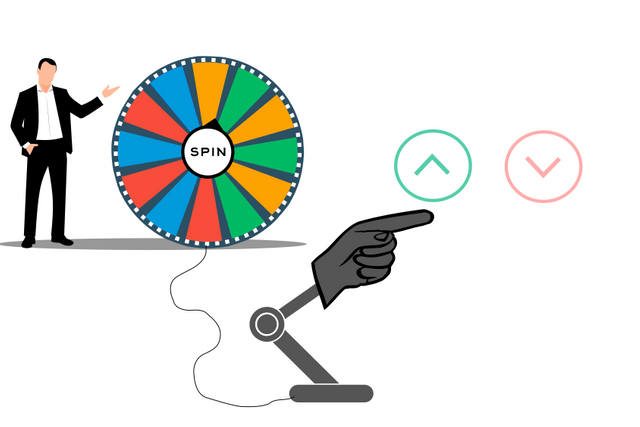Would some random votes improve the ecosystem?

Ever since I've been thinking about the idea of some systems incentivizing people to get stuck in rigid patterns and the meaning of entropy in the context of Information Theory, I've been curious about the idea of adding a little randomness as a way to improve things that are too rigid. This theme came up in an even more vivid way in a book I recently read which I posted about yesterday, where the writer specifically suggested that having at least a little randomness in the output of a feedback-learning process is valuable in keeping the process from over-optimizing to its environment and then staying stuck there if the situation changes (scroll down to the "Maybe the real treasure..." heading in my post to read the quote).
I was thinking about that in the context of the Steem ecosystem, where certain patterns seem to have set in, and I was wondering if adding some randomness might improve things. I'm thinking about this more as a thought experiment than something that would actually be implemented, but here's the idea:
If there was an initiative started by someone with a lot of SP of randomly voting for posts, and people knew that random votes were being distributed, that would 1) give a chance for overlooked content to receive some of these random upvotes, and 2) incentivize people to hunt for bad over-valued posts to downvote (who wants random garbage to potentially be draining the rewards pool?). Now, you wouldn't want to do it via some account like randomvotebot, since that would be too easy to track -- you'd want the random votes to be mixed in with normal human votes so you can't tell if they're random. So lets imagine that whoever is running this initiative delegates to people who opt-in and creates a website that decides what they should be randomly voting for and gives them an interface to do so (and tracks if they're voting for the right random posts). If people know that some people are participating in an initiative like this it also incentivizes more independent judgment about voting decisions based on the content of each post (rather than using other people's votes as a guide), and creates a norm that you shouldn't ask people why they voted a certain way (since that could undermine the secret randomness). And now with more votes flying around, more downvote action, and more plausible deniability about why you voted a certain way on a certain post it may give people more cover to downvote over-rewarded posts (whether they got that way randomly or not) without as much fear of retaliation. It might also be a counterincentive to SP concentration -- big delegation-bot accounts probably don't want to individually stomp out a zillion randomly rewarded bad posts, but if individual people kept more of their SP rather than delegating it away they might do a handful of downvotes each, covering a bigger area.
So as I said, more of a thought experiment than a genuine suggestion, but what do people think? Do my thoughts about the incentives in play make sense, or do you think it would work out differently? Would this improve the ecosystem? Make things worse?
Coincidentally, I recently learned that Ed McMahon never actually worked for Publisher's Clearing House (PCH). But, while I was reading about that, I was also wondering about how the PCH Sweepstakes model might be applied to Steem.
I was thinking about it as a method for generating, "Proof of Attention" (for lack of a better term. Other forms of "Proof of Attention" are the German community's Scrabble/Wordel games and @the-gorilla's quizzes.)
In this version, the large stakeholder might randomly reply to a post with a remark like, "You have been selected for a random upvote Sweepstakes. If you would like to participate, reply to this comment within 60 minutes.". Some sort of verification like a numeric code in an image or a captcha link could be added in order to make it harder for auto-responders.
Then, one of the replies would be randomly selected for an upvote. The idea is to prove and reward human attention.
0.00 SBD,
5.43 STEEM,
5.43 SP
I think that would get a response, but in the abstract I think adding energy from that direction would encourage more wait around type behavior. I think we need more authentic, organic, agentic behavior for the ecosystem to be healthy (which is really hard to engineer, of course, it's much easier to incentivize straightforward patterns).
0.00 SBD,
0.00 STEEM,
0.78 SP
If I were a website operator, I might do it with custom_json notifications, and a countdown timer in the web page. The "wait around" behavior would still translate to larger audience sizes for authors, and by making the website stickier, it might increase engagement too.
I'm not hung-up on any specific solution, though.
The main point is that there is a variety of ways to inject randomness, so I agree that experimentation would probably be useful.
Your comment has been supported by THE PROFESSIONAL TEAM. We support quality posts, Original quality comments anywhere, and any tags
Thank you, @sduttaskitchen.
@tipu curate
;) Holisss...
--
This is a manual curation from the @tipU Curation Project.
Upvoted 👌 (Mana: 6/7) Get profit votes with @tipU :)